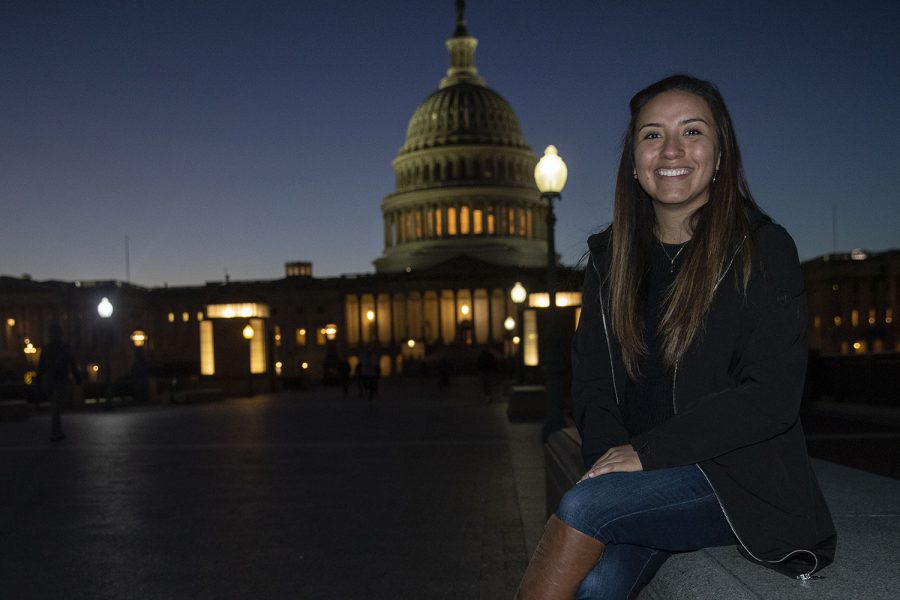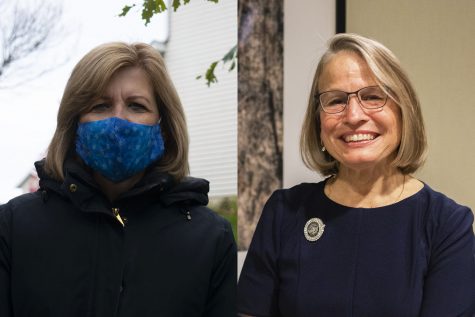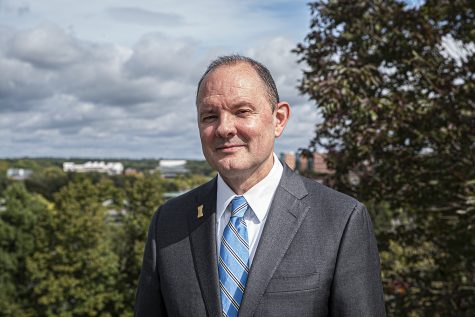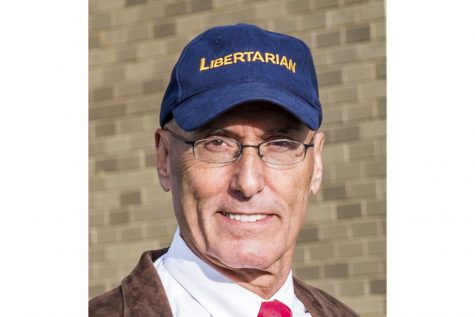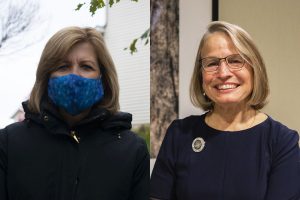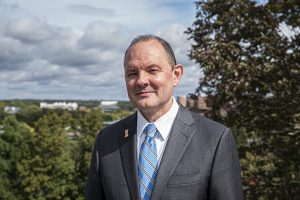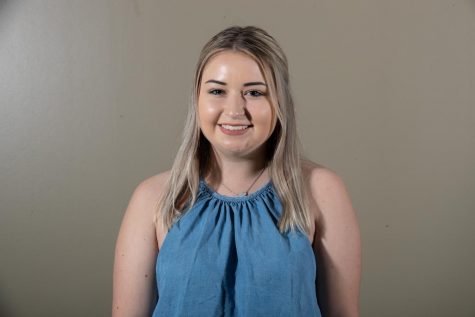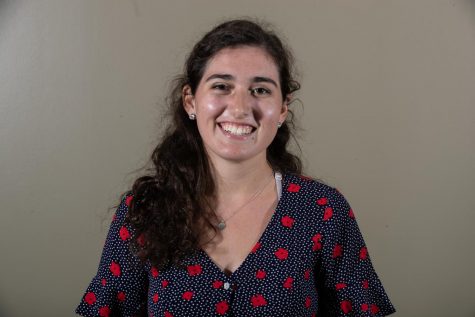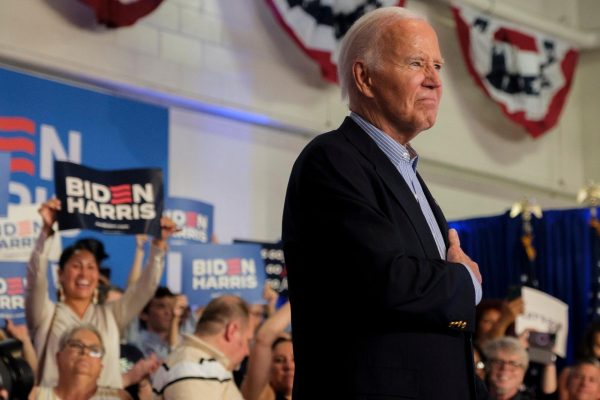Vice President-elect Kamala Harris empowers Iowa women in law and politics
After the 2020 race for the presidency was called, Sen. Kamala Harris, D-Calif., was elected as the first Black and South-Asian American woman to hold the vice presidency, encouraging women across the nation to fulfill their dreams in leadership.
Alexia Sanchez poses for a portrait at the Capitol in Washington DC on Monday, Nov. 2, 2020.
November 10, 2020
North Liberty City Councilor RaQuishia Harrington has been told all her life that she could be anything she wanted to be. As a local politician and a proud woman of color, she had just witnessed the glass ceiling shatter this weekend with a woman of color being elected to the highest branch of office within the United States’ government.
Sen. Kamala Harris, D-Calif., was elected to the vice presidency, igniting a flame for women to seek out more leadership roles. Harris, the second Black senator and first South-Asian American senator in history, has served since 2017. Come 2021, Harris will be the first Black and South-Asian American woman to serve as the United States Vice President.
Harris campaigned through Iowa on her own bid for the presidency, but dropped out of the race in December. In the Hawkeye State, women who look to Harris as inspiration often do not see others who look like them in Iowa politics. In 2019, there were just four lawmakers of color in the state legislature and Iowa has yet to elect a person of color to a statewide office.
The daughter of immigrants from both India and Jamaica, Harris has been inspired by stories of her own parents and their situations in her own life.
Phoebe Jean-Pierre, a visiting assistant professor in the UI College of Law, said she was filled with happiness at the news of Harris’ new role, due to the last four years having been detrimental in her point of view. For Jean-Pierre, a child of immigrants, Harris’ story resonates with her as someone she can identify with.
Jean-Pierre’s work focuses heavily on immigration, health, and media — three areas she anticipates the next VP will make a priority amid a pandemic and calls for change.
“Kamala Harris brings a unique perspective as someone with a diverse background,” Jean-Pierre said. “She might just see issues that Biden does not see. It’s hard to see problems that don’t affect you.”
Harris grew up in Oakland, California and graduated from Howard University, a historically Black university. She graduated from the University of California with her law degree. Soon after, she would begin her career in the Alameda County District Attorney’s Office.
At one of her campaign stops in Coralville in Sept. 2019, Harris discussed her electability to the audience in attendance.
“People said ‘no, but they’re not going to be ready for you No one like you has done it before — not based on your race, not based on your gender, not based on your platform that was about being progressive’….People said it can’t be done. And I didn’t listen,” Harris told the crowd in 2019.
Harrington, a North Liberty city councilor and the Iowa City special and underserved populations recreation supervisor, said that she felt an instant relief when hearing the news of the Biden-Harris campaign winning the 2020 election as a woman and person of color.
“It was one thing to see President Obama — but as women, we fought and worked so hard to get into any position and be listened to,” Harrington said.
In 2008, President Barack Obama was the first Black man to be elected president, with now President-elect Joe Biden. His opponent, Sen. John McCain, R-Ariz., ran with the first female Republican for the vice presidency — former Alaska Gov. Sarah Palin.
Emma Aquino-Nemecek, president of the Linn County Republican women, said in an interview with the DI, that despite Harris not being her ideal candidate for the 2020 election, she liked seeing someone who represented part of her as an Asian-American.
“It’s the politics,” Aquino-Nemecek said. “I like that she was given a chance, and I want every girl to dream that someday, it could be them. That’s what I’m hoping, as an example, that she was there. If it happens that they’re going to be confirmed, I want them to make the Asian group proud.”
Aquino-Nemecek said that she cried at the news of President Trump not returning for another term. She hopes that Harris will hear the thoughts and opinions on the other side.
“Of course, I want women to be a part of the politics, no matter what party they are in, their voices need to be heard,” Aquino-Nemecek said. “Because we need our voices heard. [Biden and Harris] are just more progressive, and I just want them to sometimes hear the other side.”
The year 2020 brought many firsts to the table for women. The 100th anniversary of the 19th amendment, establishing the right to vote for American women, was celebrated in August 2020, with events at the University of Iowa being held over the last year in partnership with the, “Hard won. Not Done.” campaign hosted by 50-50 in 2020.
Harrington said this news for Harris solidifies the power of women and what they are capable of. As a woman of color in a government position, Harrington says women are scrutinized and critiqued within their roles.
Alexia Sanchez Garcia, a University of Iowa graduate and Harris supporter has watched the “transformative moment in history” unfold before her eyes. During her tenure as the president of Iowa City’s League of United Latin American Citizens, Sanchez Garcia has spoken at campaign events in fall of 2019 for Harris’s presidential run. She currently interns in Washington D.C. doing legislative research as a Running Start congressional fellow.
“[Harris] is shifting our image into something we have never seen before,” Sanchez Garcia said. “It’s only a catalyst for future leaders.”
Harris had made a few stops in Iowa City over the last year in her own run for the Democratic nomination for president. She joined Biden’s campaign in August as his running mate.
“Women of color and Black women are held to a different standard,” Sanchez Garcia said. “We need to ensure that we are being equal and equitable to people — little girls will see that and take note. If we are more harsh to [Harris], it only validates the fears that they have.”
Harris was also a member of Alpha Kappa Alpha, a sorority that originated at Howard University.
Kristen Young, a member of the Alpha Kappa Alpha sorority at the University of Iowa, said that she had the privilege of meeting Harris at an event last year and it has been such an amazing experience to watch unfold.
Harris’ tenure as the 49th Vice President will bring many historic firsts for the nation. For women of color in politics and all over Iowa, this holds a special place in their heart.
“It’s just inspirational,” Young said. “To know that there truly is nothing that we can’t do.”
Julia Shanahan contributed to this report.



